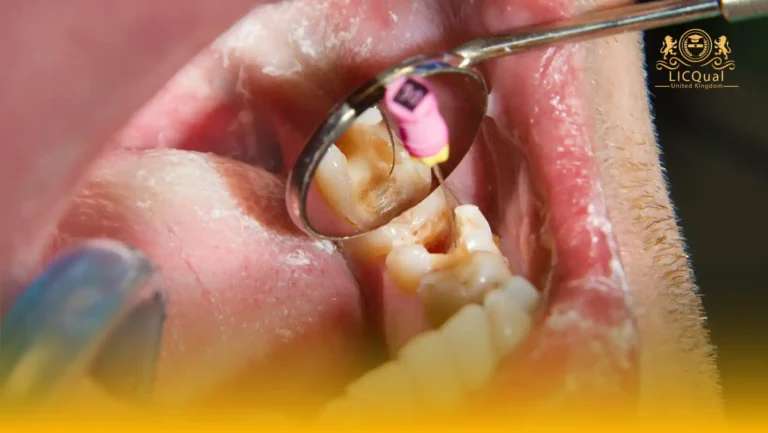The LICQual Level 6 Diploma in Food Safety and Nutrition (Dip Food Safety) is a prestigious qualification designed for professionals seeking to advance their careers within the food, health, and nutrition sectors. This comprehensive diploma equips learners with in-depth knowledge of food safety principles, nutritional science, and regulatory requirements, ensuring they can apply best practices in real-world professional settings. It is ideal for individuals looking to enhance their expertise, broaden their understanding of food and nutrition management, and strengthen their Continuing Professional Development (CPD).
Learners completing this qualification will gain the skills to assess, implement, and monitor food safety and nutrition strategies effectively. The course covers key areas such as risk assessment, hazard control, nutritional analysis, and compliance with industry standards, empowering learners to make informed decisions that promote public health and workplace safety.
LICQual ensures that all centres delivering this Level 6 Diploma uphold the highest standards of teaching and learning. Centres must employ competent and qualified staff, provide access to up-to-date learning materials, and maintain all necessary resources to support learner success. This commitment guarantees that learners receive high-quality, engaging, and practical training, enabling them to confidently apply their knowledge in professional environments.
By undertaking the LICQual Level 6 Diploma in Food Safety and Nutrition, learners position themselves as experts in their field, equipped with the skills and confidence to progress their careers, contribute to industry best practices, and achieve personal and professional growth.
Course Overview
Qualification Title
LICQual Level 6 Diploma in Food Safety and Nutrition (Dip Food Safety)
Total Units
6
Total Credits
120
GLH
480
Qualification #
LICQ2201090
Qualification Specification
To enroll in the LICQual Level 6 Diploma in Food Safety and Nutrition (Dip Food Safety), applicants must meet the following criteria:
|
Qualification# |
Unit Title |
Credits |
GLH |
|---|---|---|---|
|
LICQ2201090-1 |
Advanced Food Safety Management |
20 |
80 |
|
LICQ2201090-2 |
Nutrition Science and Application |
20 |
80 |
|
LICQ2201090-3 |
Food Law, Regulations, and Compliance |
20 |
80 |
|
LICQ2201090-4 |
Advanced Microbiology and Food Safety |
20 |
80 |
|
LICQ2201090-5 |
Risk Assessment, Auditing, and Quality Control |
20 |
80 |
|
LICQ2201090-6 |
Professional Practice and Research in Food Safety |
20 |
80 |
By the end of this course, learners will be able to:
Unit 1: Advanced Food Safety Management
By the end of this unit, learners will be able to:
- Critically evaluate the principles of food hygiene and the role of food safety management systems in professional settings
- Analyse potential food hazards and apply risk assessment techniques to identify and mitigate risks
- Develop and implement effective food safety management strategies in compliance with industry standards
- Assess the effectiveness of food safety procedures and recommend improvements to enhance operational safety
Unit 2: Nutrition Science and Application
By the end of this unit, learners will be able to:
- Examine the roles and functions of macronutrients and micronutrients in human health and wellbeing
- Analyse dietary requirements across different population groups and apply nutritional knowledge to meal planning
- Evaluate the impact of diet on health outcomes, including chronic disease prevention
- Design evidence-based nutrition interventions suitable for professional or community settings
Unit 3: Food Law, Regulations, and Compliance
By the end of this unit, learners will be able to:
- Critically evaluate national and international food legislation and regulatory frameworks
- Interpret legal requirements and apply them to food safety management and operational practice
- Assess organisational compliance with food law and identify areas requiring corrective action
- Develop strategies to ensure continuous adherence to legal and regulatory standards in food-related operations
Unit 4: Advanced Microbiology and Food Safety
By the end of this unit, learners will be able to:
- Analyse the biology and behaviour of microorganisms that affect food safety
- Evaluate sources of contamination and the mechanisms of foodborne illnesses
- Apply advanced control and monitoring techniques to prevent microbial hazards in food
- Design hygiene and sanitation protocols that comply with international best practices
Unit 5: Risk Assessment, Auditing, and Quality Control
By the end of this unit, learners will be able to:
- Conduct comprehensive risk assessments and interpret results to inform management decisions
- Critically appraise audit processes and quality control measures within food and nutrition operations
- Implement continuous improvement strategies to enhance safety, quality, and operational efficiency
- Evaluate organisational performance against established standards and recommend corrective actions
Unit 6: Professional Practice and Research in Food Safety
By the end of this unit, learners will be able to:
- Conduct research and critically analyse current practices in food safety and nutrition
- Apply professional judgement to solve complex problems and implement innovative solutions
- Demonstrate leadership and effective communication in promoting food safety and nutrition best practices
- Reflect on personal development and professional practice to support lifelong learning and CPD
The LICQual Level 6 Diploma in Food Safety and Nutrition (Dip Food Safety) is designed for professionals and learners who want to develop advanced knowledge in food safety, nutrition, and public health. This qualification is ideal for those aiming to enhance their career prospects, gain professional recognition, or transition into roles in food safety, healthcare, or nutrition. It suits both experienced practitioners and aspiring experts seeking a Level 6 diploma with practical and scientific relevance.
Healthcare and Allied Health Professionals
- Nurses, dietitians, and healthcare assistants aiming to strengthen nutrition and food safety expertise
- Public health practitioners working on community health and nutrition initiatives
- Professionals involved in patient care requiring food hygiene knowledge
- Individuals seeking an accredited Level 6 food safety and nutrition diploma
- Practitioners looking to implement evidence-based nutrition strategies
- Professionals aiming to enhance multidisciplinary healthcare practices
Food Industry and Safety Professionals
- Food safety officers and quality assurance specialists seeking formal recognition
- Professionals in food production, processing, and catering industries
- Individuals responsible for implementing food hygiene and safety standards
- Managers and supervisors in food-related businesses
- Those seeking an advanced diploma in food safety and nutrition
- Professionals aiming to meet regulatory compliance and safety guidelines
Nutrition and Wellness Practitioners
- Nutrition advisors and wellness consultants looking for scientific grounding
- Fitness trainers incorporating dietary guidance into their services
- Health coaches supporting lifestyle changes through nutrition knowledge
- Professionals pursuing an internationally recognised Level 6 diploma
- Individuals aiming to strengthen credibility in nutritional science practice
- Practitioners integrating food safety with health promotion programs
Education and Training Professionals
- Teachers and trainers delivering nutrition, dietetics, or food safety programs
- Adult education professionals seeking Level 6 diploma progression
- Professionals designing evidence-based food safety training modules
- Lecturers aiming to enhance curriculum with nutrition science knowledge
- Trainers preparing learners for practical and regulatory compliance in food
- Individuals seeking to improve instructional credibility and expertise
Public Health and Policy Professionals
- Public health officers involved in food safety and nutrition programs
- Policy makers supporting health and nutrition initiatives
- Professionals contributing to local or national public health campaigns
- Learners seeking Level 6 food safety and nutrition qualification for policy roles
- Practitioners interested in evidence-based nutrition and safety frameworks
- Professionals aiming to influence public health policy through nutrition
Career Changers and Aspiring Professionals
- Individuals transitioning into food safety, nutrition, or public health careers
- Graduates pursuing structured progression in nutrition and health fields
- Professionals from related sectors seeking accredited food safety qualifications
- Learners aiming for an international Level 6 food safety and nutrition diploma
- Career-focused individuals seeking long-term professional growth
- Those wanting practical and scientific expertise for career advancement
Professionals Seeking Academic and Professional Progression
- Learners planning progression to higher-level nutrition or food safety study
- Professionals seeking globally recognised qualifications for career advancement
- Individuals aiming to strengthen skills in evidence-based nutrition practice
- Practitioners aspiring to senior or specialist roles in food safety or health
- Learners seeking structured, practical, and research-informed development
- Professionals committed to long-term careers in nutrition, wellness, and public health
To ensure high-quality delivery and learner success, centres offering the LICQual Level 6 Diploma in Food Safety and Nutrition must meet the following requirements:
- Qualified and Competent Staff: Centres must employ experienced tutors and assessors who are fully qualified in food safety, nutrition, and related fields, with a clear understanding of Level 6 learning outcomes and assessment standards.
- Comprehensive Learning Materials: Centres must provide up-to-date, industry-relevant resources, including textbooks, research materials, case studies, and digital learning tools to support theoretical and practical learning.
- Practical Facilities and Equipment: Centres must have access to industry-standard food preparation and safety equipment, laboratory facilities, and hygiene tools to enable learners to gain hands-on experience.
- Assessment and Support Resources: Centres must maintain robust assessment tools, guidance documents, and learner support mechanisms to ensure consistent evaluation and high completion rates.
- Health, Safety, and Compliance: Centres must adhere to all relevant health and safety regulations, ensuring a safe learning environment that meets statutory and industry standards.
- Commitment to Continuous Professional Development (CPD): Centres should promote CPD opportunities for both staff and learners to maintain knowledge of emerging industry practices and regulations.
- Administrative and Technical Infrastructure: Centres must have effective administrative systems and technology to manage enrolments, track learner progress, and maintain records in compliance with LICQual standards.
Meeting these requirements ensures that learners receive high-quality, engaging, and practical training, preparing them to apply their knowledge confidently in professional food safety and nutrition roles.
Assessment and Verification
All units within this qualification are subject to internal assessment by the approved centre and external verification by LICQual. The qualification follows a criterion-referenced assessment approach, ensuring that learners meet all specified learning outcomes.
To achieve a ‘Pass’ in any unit, learners must provide valid, sufficient, and authentic evidence demonstrating their attainment of all learning outcomes and compliance with the prescribed assessment criteria. The Assessor is responsible for evaluating the evidence and determining whether the learner has successfully met the required standards.
Assessors must maintain a clear and comprehensive audit trail, documenting the basis for their assessment decisions to ensure transparency, consistency, and compliance with quality assurance requirements.







